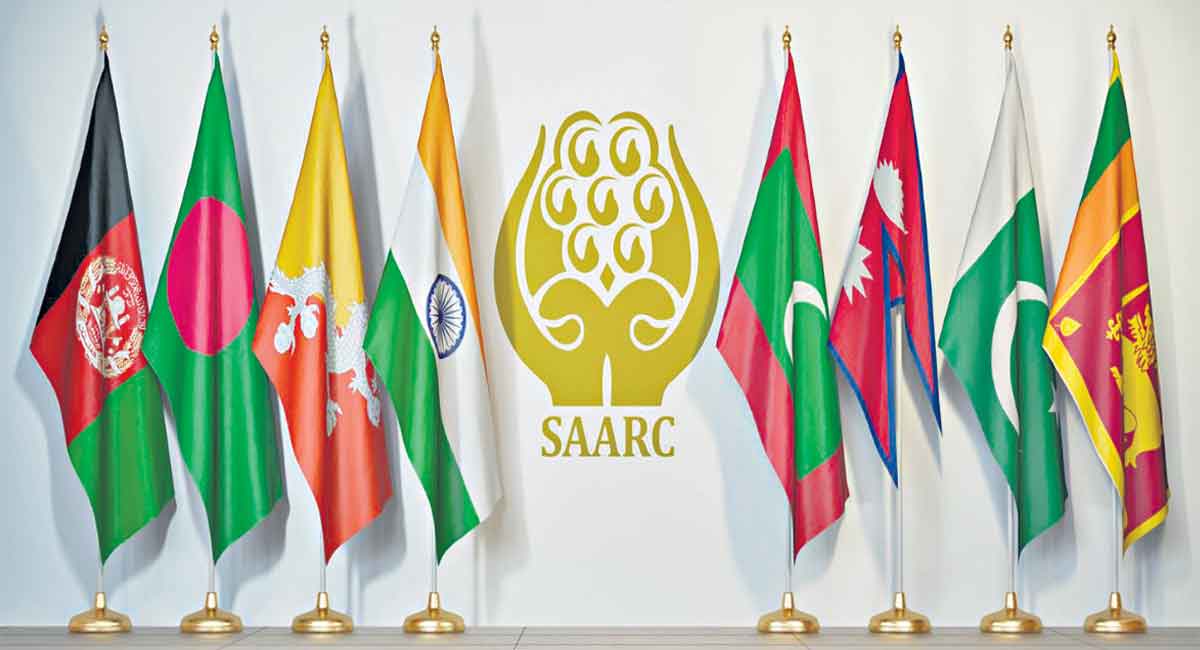Published: Publish Date – 12:45 am, Tue – 7 June 22

by Dhananjay Tripathi
South Asia stands at a crossroads – challenges and possibilities. The severe economic crisis in Sri Lanka, the withdrawal of the Taliban in Afghanistan and the change of government in Pakistan are in the middle. There is also political turmoil in countries like Nepal and Maldives, as elections are going to be held in both the countries soon. Nepal is likely to hold general elections by the end of this year; In Maldives, it is in 2023. There are political conflicts on interesting lines in these two countries.
In Maldives, it is about India, where opposition leader Abdulla Yameen is leading the ‘India Out’ campaign. Notably, India-Maldives relations have matured over the years under the leadership of the current President of Maldives, Ibrahim Mohamed Solih. As a matter of fact, Indian Prime Minister Narendra Modi personally invested in this relationship and visited Maldives soon after returning to power for the second time in 2019. This is the reason why Yameen is critical of India, but experts believe that it is also at the behest of China. Like Mahinda Rajapaksa of Sri Lanka, Yameen also maintained close ties with China during his presidency (2013–2018). Whatever may be Yameen’s political motive, the fact is that India strongly supported the Maldives, including unconditional help during the pandemic.
Similarly, in Nepal, some communist leaders are expressing political discontent against the Millennium Challenge Corporation (MCC) grant of $500 million given by the United States of America (USA). For some of Nepal’s communist leaders, the MCC is a way to bring their country into the Indo-Pacific framework – the center of competition between India and China where the East is supported by the West.
Indo-Pacific Strategy
Interestingly, no western country has included China as a competitor in its Indo-Pacific strategy. Nevertheless, China continues to accuse without hesitation of pitting the West against its interests in the Indo-Pacific. Thus, the leaders of Nepal, in opposition to the MCC, are taking a political position indirectly confirming the Chinese allegation. In Nepal, the India-China debate has dominated over the years, but now it is about the United States.
The region has suffered equally during the pandemic in terms of human casualties and economic volatility. Some of the economies dependent on tourism have performed poorly due to the slowdown in the sector as the world has been subject to most travel restrictions in the past few years. We know how this affected Sri Lanka financially, where other poor economic decisions by the Rajapaksa government exacerbated the situation.
regional integration
South Asia, except India, consists of smaller states that have performed well economically over the past few decades; Nevertheless, their economic base is quite limited. Barring India, none of these countries is in a position to suffer a significant economic shock.
While regional integration is the most preferred solution to address the economic crisis for smaller states, they hardly show a keen interest in regionalism. This is due to their apprehension about North India as a regional superpower and belief that South Asian regionalism can benefit India the most. This is not an unfounded reason; India will certainly get the most out of an integrated regional economy, but so will others. Due to its economic size, India may get a bigger share, but regional integration will not be a zero-sum for others. This will help all the economies in the region, though serious brainstorming is needed to move forward.
Internal political conflicts in various South Asian countries, and the involvement of external powers for their planned purposes, are not the solution for South Asia. As discussed in the case of both Nepal and Maldives, how a non-regional Asian power is interfering in domestic politics, eyeing its own interests and countering India.
political fault
It is nave to assume that New Delhi will not respond to such a challenge coming from China in its neighbourhood. Thus, the balance between India and China as smaller states believe it is becoming a battleground for Asian superpower rivalry where the West will also be interested. This will have long-term political implications. Smaller states would needlessly be trapped in a cycle of competition that they would not be able to control beyond a point. Regional integration and economic interdependence are ways of examining some of the potential adverse effects that are probably inevitable if political faults continue to exist in South Asia.
For India too, strengthening the regional platform would be better than focusing more on bilateralism. The best part is that India has been focusing on the neighbourhood over the past few months, reaching out to countries like Sri Lanka and Afghanistan that need immediate help. Nevertheless, a regional approach can reduce the fear of Indian dominance and counter China’s political interference in some countries.
South Asian countries have not met officially under the umbrella of SAARC as no summit has taken place in the last few years. The 18th SAARC summit was held in Kathmandu in 2014, and the 19th SAARC summit was scheduled in Islamabad. After the Uri terrorist attack, India refused to participate in this regional summit as a Pakistan-based terrorist group was responsible for the Uri attack.
Not only India but also Afghanistan and Bangladesh supported India’s position and pulled out of the summit. Thus, the 19th SAARC Summit is still awaited, and Indian initiatives could make it possible. Pakistan, over the years, has realized that its terrorism-based foreign policy has not given it anything good. Holding the SAARC summit in Islamabad will improve the image of Pakistan, which has for years surrounded itself in the region, relying heavily on China.
The SAARC summit will set a constructive, non-controversial regional agenda that will help every country in the region. In this changing world order, a strong united South Asia can bring about change and give importance to the voice of developing countries.

(The author is Associate Professor, Department of International Relations, South Asian University. dhananjay@sau.ac.in)